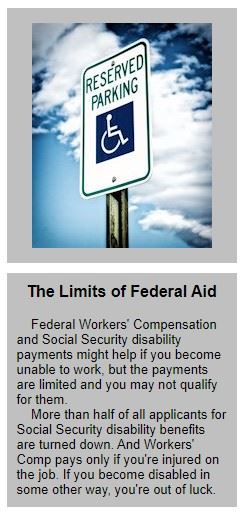One of the unfortunate facts of life is that people are sometimes stricken by a disability that prevents them from working. Even if health insurance covers the medical bills, there isn't always enough money to cover the mortgage, utility bills and daily living expenses.
That's where a disability insurance policy comes in. If your ability to earn a living is impaired on or off the job, the coverage can supply you with needed cash flow.
 Even if you have group disability insurance, however, that may not be enough.
The drawbacks include:
Even if you have group disability insurance, however, that may not be enough.
The drawbacks include:
- The coverage may be short-term, perhaps limited to two years.
- The coverage may be subject to dollar limits.
- The waiting period until benefits begin may be longer than your savings will last.
For these reasons, you may want to buy individual disability coverage to supplement what's available from a group plan or to provide protection that's lacking.
Disability benefits are pegged to your income from before a disability: You can probably only buy coverage that pays 60 percent to 80 percent of your income from all sources. (Insurance companies obviously don't want to provide any incentives to become disabled.)
For example, if you earn $10,000 per month, insurance companies might not want you to have more than $6,000 to $8,000 per month in disability benefits. With group coverage, you might qualify for another $2,000 in supplemental individual benefits.
Tax treatment: Assuming you pay for the premiums yourself, with after-tax dollars, any
benefits you receive are tax-free. However, if your company pays all of
the premiums with pre-tax dollars, your benefits are entirely taxable.
Here are a few other factors to consider and discuss with your insurance
advisor when shopping for disability coverage:
Try getting individual coverage first. Get the most coverage you can, based on your income. Then, you may be able to get additional coverage with a group plan. If you start with group coverage, the insurance companies probably will put a limit on individual coverage.To cut costs, consider a policy that pays until age 65. This would be a smarter move than buying a policy that pays lifetime benefits. If the purpose of disability insurance is to replace lost income, you might not be earning income after 65 anyway, so the extra coverage would be superfluous.
That's particularly true if you have other assets you can tap into after you retire. However, you may need lifetime benefits if you don't have assets in place for retirement. If you do opt for lifetime benefits, one way to cut the policy costs somewhat is to extend the waiting period before benefits begin to 90 days or longer.
Check into how a policy defines disability. An "own occupation" policy provides benefits if you can no longer perform the duties in your customary job. Other policies only pay if you're unable to work at any job that you're reasonably trained to do.

